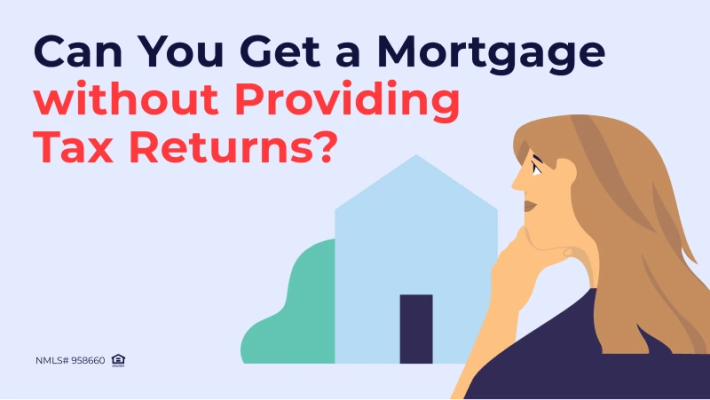

More and more potential homeowners have a distinct challenge: they need a mortgage loan without tax returns provided. This is especially true for the self-employed and those with fluctuating incomes. The problem is that their financial picture isn’t always as clear-cut as a steady paycheck from a traditional job. It can be difficult to accurately represent their income and expenses on a tax return. Unfortunately, traditional lenders are quite rigid when it comes to requiring tax returns. They see them as a crucial piece of the puzzle, a way to assess a borrower’s financial stability and risk. But what about those clients who don’t fit the traditional mold, those who have built successful businesses but whose income doesn’t follow a predictable pattern? Fortunately, there are alternative income documentation options available. While it may be more challenging, it’s not impossible to secure a mortgage without tax returns. You’ll need to get creative and look for lenders who are more flexible and willing to consider alternative documentation. This could include bank statements, profit and loss statements, or other financial records that can paint a clearer picture of your client’s financial health.
Understanding the Need for a Mortgage Loan without Tax Returns
So, why can it be difficult for some borrowers to provide tax returns? Self-employed individuals, for example, often face challenges in accurately reporting their income. Their earnings can fluctuate significantly from year to year. As a result, tax returns may not always demonstrate an accurate or stable picture of their financial situation. Another example is business owners or investors with significant write-offs – expenses that can be deducted from the taxable income. This can reduce the amount of income they pay taxes on, making it seem lower than their actual earning potential. Individuals with multiple sources of income, such as from multiple businesses, investments, or rental properties, may also struggle to compile tax returns that reflect the entire financial picture. There are many other circumstances that can make it difficult to come up with a straightforward and comprehensive tax history. From complex financial situations like divorce and inheritance to significant business changes and recent business startups, these can all introduce complexities that traditional lenders may struggle to understand.
Options for Mortgage Loan without Tax Returns
Now that the reasons for the possible lack of traditional documentation are clear, the question of how to get a mortgage without tax returns still remains open. And the answer is straightforward – find and secure the right loan. So, let’s explore mortgage products that don’t require traditional tax documentation.
Bank Statement Loans
One of the most popular alternative income verification mortgage options is the bank statement loan. Instead of relying on tax returns, lenders assess a borrower’s financial health based on their bank statements. Typically, personal or business bank statements for the past 12 or 24 months are required. This approach is particularly beneficial for the self-employed or freelancers who may have fluctuating incomes that are difficult to report on a tax return. With the potential challenges of these individuals in mind, AD Mortgage offers a 12/24 Month Statement program that accommodates a range of borrower needs by accepting both personal and business statements, with the option to combine them for income qualification. Additionally, to speed up and streamline the mortgage process for you and your clients, AD Mortgage provides a free Concierge Service that assists with accurate income calculations and qualification estimates within 24 hours.
Profit and Loss Statement
Loans Another mortgage program that relies on financial statements rather than traditional tax returns is P&L (profit and loss). These loans allow borrowers to use their business’s profit and loss statements for the past one or two years to qualify; sometimes, depending on the loan-to-value ratio, bank statements may also be required. This option is particularly beneficial for self-employed individuals, business owners, and entrepreneurs who have a steady income stream but may not have the traditional documentation required for a mortgage. The Wiley Group LLC offers a flexible P&L mortgage solution that doesn’t require bank statements if the applicant’s LTV is up to 70%. We understand that every situation is unique, so we may consider borrowers with 1 year in business.
DSCR Mortgages
DSCR (Debt Service Coverage Ratio) loans are a unique option that focuses on the ability to repay the loan based on the cash flow generated by the investment property itself. It’s an excellent choice for real estate investors who don’t want to qualify based on personal income or tax returns. Designed with the needs of investors in mind, The Wiley Group LLC's DSCR loan program offers qualification based solely on the projected income generated by the investment property. With no debt-to-income requirements and allowing for DSCRs as low as 0, The Wiley Group's DSCR loans provide an efficient solution for investment financing.
Asset-Based Mortgages
Another option to consider is an asset-based mortgage. These loans qualify borrowers based on their personal assets, such as savings or investments, rather than their income. This can be a great option for high-net-worth individuals with significant financial resources.
Requirements for a Mortgage Loan without Tax Returns
While no-tax-return mortgages offer flexibility, they often come with stricter requirements. This is due to the need to mitigate the risk associated with relying on alternative documentation. Thus, lenders may require a credit score that is significantly higher than what is typically acceptable for traditional mortgages. This is because they rely less on income verification and more on the borrower’s creditworthiness to assess risk. Another thing is a larger down payment. No-tax-return mortgages often require a down payment that is significantly higher than traditional mortgages. This serves as a cushion for the lender in case the borrower encounters financial difficulties. Additionally, interest rates on mortgages without tax returns are generally higher than those on traditional mortgages. Again, this is due to the increased risk associated with these loans. Contact the The Wiley Group LLC to explore your no tax return options.
